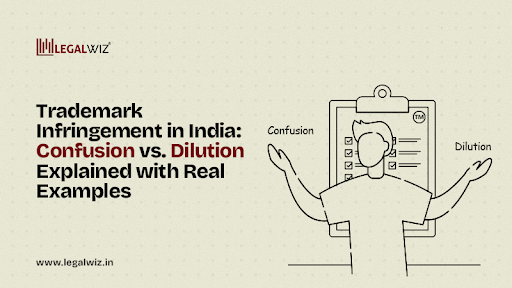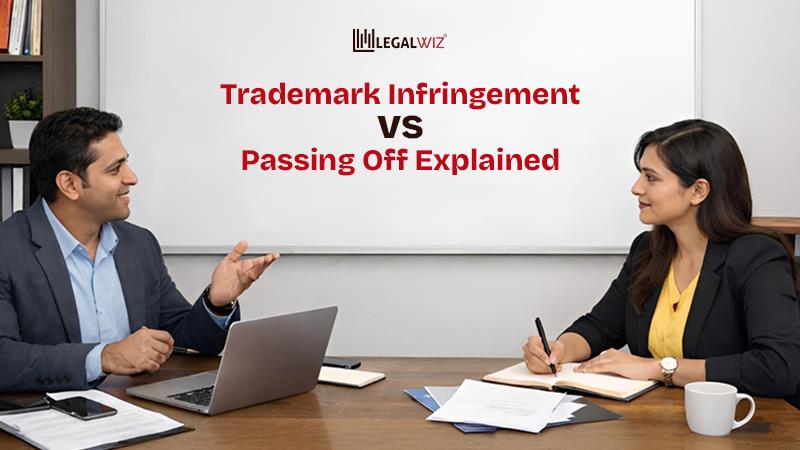Trademark Infringement in India: Confusion vs. Dilution Explained with Real Examples
In the dynamic and competitive Indian marketplace, your brand is not just your identity—it’s a business asset that can make or break your market presence. Yet, many Indian entrepreneurs and businesses overlook the importance of trademark protection until it’s too late. To stay legally protected and commercially competitive, it’s critical to understand the two major types of trademark infringement: likelihood of confusion and trademark dilution—and why registering your trademark under the Trade Marks Act, 1999 is essential.
The Two Pillars of Trademark Infringement
1. Likelihood of Confusion – The Direct Threat
This is the most common ground for a trademark infringement. A mark is said to infringe another when it’s so similar that consumers are likely to be confused about the source of the goods or services. Hence, a trademark owner also uses trademark law to prevent unauthorized third-party use of the mark, a likelihood of confusion.
Example: Suppose you run a textile business under the name “SilkWeave” and someone else starts using “SilkWave” in the same business of textile. Even if the products are not identical, consumers might assume an association between the two brands. That’s actionable under Indian trademark law.
Fabindia v. Fab India Emporium (Delhi High Court, 2024)
Fabindia, a well-established retailer of handcrafted goods, filed a suit against Fab India Emporium for trademark infringement, arguing that the defendant’s use of the name “Fab India Emporium” was deceptively similar to their trademark “FABINDIA,” which had been in use since 1960 and had garnered significant goodwill and reputation. The Delhi High Court found in favor of Fabindia, holding that the defendant’s use of “Fab India Emporium” was indeed deceptively similar and likely to cause confusion. The court granted a permanent injunction, restraining the defendant from using the name “Fab India Emporium” or any other mark deceptively similar to “FABINDIA,” thereby protecting the plaintiff’s trademark rights and preventing consumer confusion.
Factors considered that suppose mark is causing confusion in the mind of consumer
- Visual, phonetic, and structural similarity
- Nature of goods/services
- Class of consumers and trade channels
- Evidence of confusion or intent to deceive
Google LLC v. MakeMyTrip (India) (P) Ltd., 2023 SCC OnLine Del 7965, decided on 14-12-2023]
In December 2023, the Delhi High Court delivered a significant ruling in the trademark dispute between MakeMyTrip and Booking.com, where MakeMyTrip had filed a case alleging trademark infringement. The issue arose when Booking.com used “MakeMyTrip” and “MMT” as keywords in Google Ads, which led to MakeMyTrip arguing that this could mislead consumers into believing that Booking.com was associated with their brand. However, the Delhi High Court ruled in favor of Booking.com, concluding that the use of these terms as keywords did not amount to trademark infringement. The court highlighted that the likelihood of confusion between the two brands was minimal, largely due to the distinct identities and separate market presence of MakeMyTrip and Booking.com. It noted that merely resembling a trademark or using similar terms in online ads does not automatically lead to consumer confusion, and that minimal confusion is insufficient to establish a case of trademark infringement. This ruling emphasizes that courts will carefully evaluate the extent of confusion and brand distinctiveness before granting relief in trademark matters.
Hence, it is important to register your brand name in order to protect its distinct identity and avoid the consumers from confusion of misleading the brand names of third party or unauthorised user.
2. Trademark Dilution – The Brand Blurring Threat
Trademark dilution is a subtle but critical issue, particularly for well-established and renowned brands. Unlike traditional trademark infringement cases, where the key issue is whether consumers are likely to be confused by similar marks, dilution focuses on a different concept—whether the value and distinctiveness of a trademark are harmed, even if no direct confusion occurs.
Trademark dilution can occur even when the alleged infringer operates in an entirely different industry or market segment than the famous brand. The essence of the claim is the potential harm to the strength or reputation of the famous mark, regardless of whether consumers are misled. As such, dilution is considered a more subtle but serious threat to brand integrity and market dominance.
There are two primary forms of dilution
1. Blurring
This form of dilution occurs when a famous trademark loses its distinctiveness and uniqueness due to its widespread use in association with unrelated goods or services. The classic example of blurring might be a situation where a famous trademark like “Google” is used for a business entirely unrelated to technology, such as a plumbing company. The use of “Google” in this context could diminish the distinctiveness of the brand, causing it to become more generic or lose its unique association with search engines and technology. Blurring undermines the brand’s identity and can dilute its market presence by making the mark appear less exclusive.
2. Tarnishment
Tarnishment refers to when a famous trademark is used in a context that harms its reputation, usually by associating it with negative or inappropriate products, services, or content. For example, a luxury brand name used in association with adult content or illegal activities could tarnish the brand’s prestigious image, making it appear less sophisticated or respectable. Tarnishment erodes the goodwill the brand has carefully cultivated, leading to potential loss of consumer trust and market value.
Marvel Tea Estate India Ltd. v. Gurukirpa Traders (2024)
Marvel Tea Estate India Ltd. filed a suit alleging dilution of its “MARVEL” trademark by Gurukirpa Traders, who were using a similar mark for unrelated goods. The Delhi High Court found that the “MARVEL” trademark had acquired a unique reputation in the market, satisfying the requirements for protection against dilution under Section 29(4) of the Trade Marks Act. The court held that the defendant’s use of a similar mark was likely to dilute the plaintiff’s trademark, even for unrelated goods.
While dilution claims apply specifically to registered trademarks, the concept emphasizes the importance of not only creating strong and recognizable brands but also safeguarding them through appropriate legal measures. Brands must, therefore, invest in proactive legal strategies and maintain control over their trademarks to protect against dilution threats and ensure their long-term value in the marketplace.
In essence, trademark dilution highlights the importance of preserving a brand’s identity, reputation, and market position, even when there is no risk of direct consumer confusion. By defending against dilution—whether through blurring or tarnishment—brands can ensure that their unique identity remains intact, protecting both their current and future business success.
Conclusion: Build It. Brand It. Register It
Trademark infringement—whether by confusion or dilution—is a real and growing threat. In India’s rapidly expanding digital and global economy, where businesses compete not just locally but across national and online boundaries, brand identity has become a core asset—one that defines customer trust, market visibility, and long-term value. For both emerging startups and established enterprises, securing this identity through proactive trademark registration is no longer optional—it’s a strategic necessity. A registered trademark does more than provide legal protection; it enhances brand credibility, attracts investors, safeguards against misuse, and opens doors for expansion in India and abroad. In a market where lookalike brands and digital impersonation are increasingly common, delaying registration can leave your business vulnerable to confusion, lost sales, or even rebranding costs. Taking early action empowers you to control your brand’s narrative, reputation, and commercial future—before someone else takes advantage of your name. Don’t wait for someone to copy your brand or confuse your customers. Register your trademark and take control of your business identity before someone else does.
How LegalWiz.in Can Help
At LegalWiz.in, our IPR experts offer complete support for your trademark needs, including:
- Trademark Search – Detailed availability report to ensure your trademark is unique.
- Application Filing – Expert drafting and filing of your trademark application.
- Objection Replies – Crafting and submitting responses to any objections raised.
- Hearing Representation – Representation in hearings scheduled by the registry.
- Trademark Opposition – Comprehensive assistance throughout the trademark opposition process.
Final Takeaway
In the race to stand out, a strong brand isn’t enough—it must be protected. Trademark infringement, whether through confusion or dilution, can quietly erode what you’ve worked hard to build. With expert support from LegalWiz.in, safeguarding your brand becomes not just easier but smarter. Don’t wait for a dispute to recognize the value of your trademark. Act early, stay informed, and let your brand lead with confidence.

Rutvi Contractor
Rutvi Contractor is a legal professional specializing in Corporate and Commercial Law with a focus on intellectual property. A gold medalist from GLS University, she has authored a dissertation on trademark confusion and dilution under Indian and U.S. law. With experience across Civil, Sessions, and High Courts in Gujarat, she brings both academic insight and courtroom perspective to her writing.







